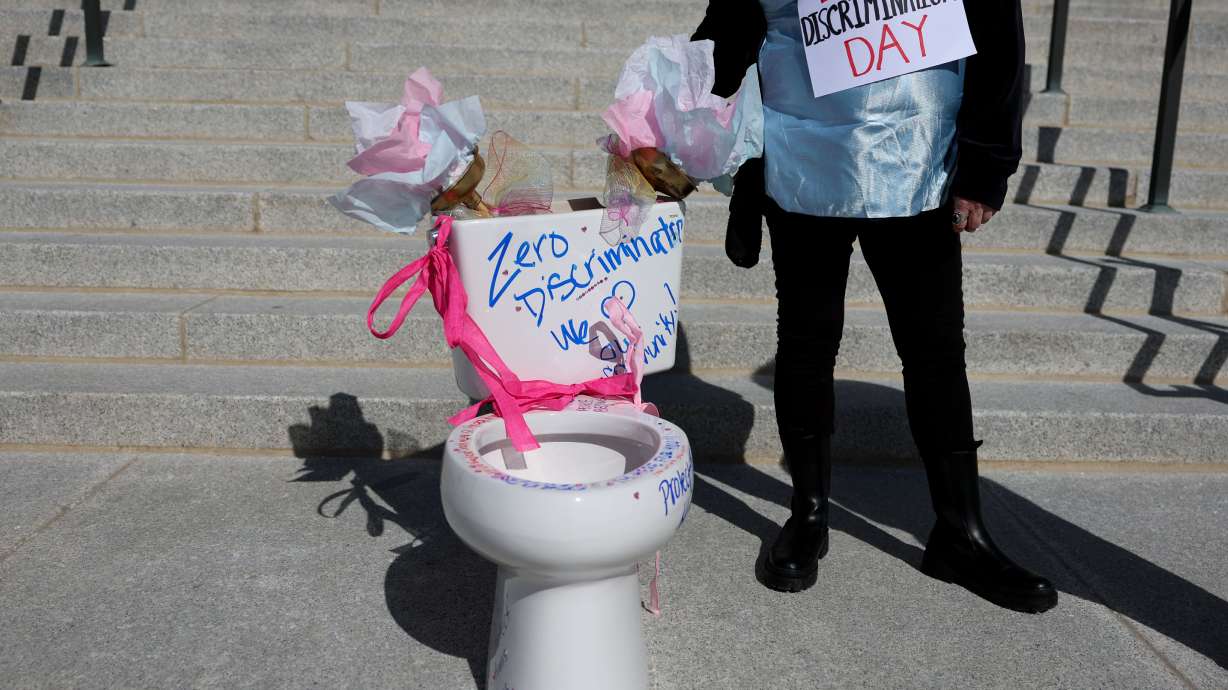
SALT LAKE CITY — Utah lawmakers quickly ushered a controversial bill restricting restroom access for transgender people through early in the legislative session, but anger over the bill is still driving backlash at the Capitol.
Several members of the Utah Students United group expressed that anger with the bill on Friday, rallying outside the Capitol on the morning of the last day of the session by encouraging LGBTQ community members to “flush their fears away” by signing their names in permanent marker on the porcelain.
Although HB257 has already passed and was signed into law weeks ago, those in attendance still felt a visceral anger about the bill that many have criticized as an attack on the transgender community.
“It’s an absolute gross use of our government power,” said Judd Guon, the president of Utah Queer Support, a support group for LGBTQ+ adults. “Trans people have the right to use bathrooms. Trans people are men and women.”
“You guys are wrong,” Guon added. “I’m sorry to say, if you were actually for equality, if you were actually for human rights, if you were actually for supporting people in your community, you would not be banning people from using the locker room and bathroom they feel most comfortable in.”
Supporters of the bill have argued that it will protect women and girls in locker rooms and restrooms, and have highlighted provisions in the law that enshrine certain anti-discrimination protections in state code.
“Eventually, the government has to draw a line somewhere,” Sen. Dan McCay, R-Riverton, the floor sponsor of the bill, told reporters in January. “It’s not anybody’s favorite thing to do, and I wish we weren’t having this debate, but here we are.”
The bill is not the only high-profile bill dealing with transgender issues to be passed by the Republican-controlled Legislature, after lawmakers passed a prohibition on transgender girls participating in high school sports in 2022 and banned gender-related surgeries for minors last year.
LGBTQ+ advocates have said the bills have hurt an already vulnerable population, and the impacts of HB257 are already being felt by some in the community — although the enforcement of bathroom access won’t be in effect until May 1.
“I have heard community members who are already feeling the impact of (the bill) in relation to their transgender youth,” Sue Robbins, a member of Equality Utah’s Transgender Advisory Council and a transgender woman, told KSL.com on Friday.
“This has been a really tough session for the LGBTQ community — in particular our transgender community,” she said. “It feels like we have a lot more message bills that have come through here, and I’ve tracked more bills that impact my community than I have in any other year and it’s been a drastic increase. … For my community, I see you, and we’re going to keep working on this and we hope to make it better.”
Democrats in the House and Senate minorities have expressed frustration with this year’s legislative session, and House Minority Leader Angela Romero, D-Salt Lake City, called it “the toughest session I’ve had.” Romero included HB257 in what she called a pair of “culture war” bills passed early on in the session, which she said is evidence of growing polarization in Salt Lake City.
When asked about the divisiveness on display, Gov. Spencer Cox said he can see where Democrats are coming from, but believes the bill and other controversial measures received adequate input from stakeholders on both sides and praised lawmakers for holding hours of hearings in both the House and Senate.
“I’m sure it has been a tough session for the minority party. It always is, right?” he told KSL.com Friday. “I don’t know that it’s substantially different than other election years, which … there’s a higher degree of difficulty during an election year than others.”
But process aside, advocates remain frustrated over the outcome, and expressed solidarity with those in the transgender community. Robbins, who attended the Utah Students United rally, said she did so to “support all our voices that come out and express how they feel, how they are hurt, how they are harmed.”
“These are our youth. These are our future,” she said. “And these are people we should be listening to and giving them a clear path to equal access to everything in our community instead of trying to push them down and push them back.”



